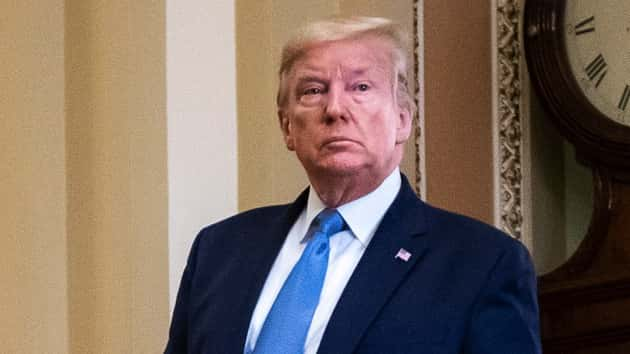
Official White House Photo by Tia Dufour
Official White House Photo by Tia DufourBy DEVIN DWYER, ABC News
(WASHINGTON) — In a history-making decision on Thursday, the Supreme Court ruled President Donald Trump cannot block a subpoena for his financial records sought by a New York prosecutor, ruling he is not immune from criminal investigation.
The decision is a major legal defeat for President Trump, although it is highly unlikely the public will see the president’s tax returns or financial records before Election Day.
In the most recent time Chief Justice John Roberts has sided with the court’s liberal side in a high-profile case, he wrote for the 7-2 majority, “Article II and the Supremacy Clause do not categorically preclude, or require a heightened standard for, the issuance of a state criminal subpoena to a sitting President.”
The majority rejected the president’s claims of absolute immunity from criminal investigative process and affirms the ability of the Manhattan DA to subpoena he president’s financial records — but the court returns the matter back to a lower court for further proceedings to allow the president to “raise further arguments as appropriate.”
“Two hundred years ago, a great jurist of our Court established that no citizen, not even the President, is categorically above the common duty to produce evidence when called upon in a criminal proceeding. We reaffirm that principle today and hold that the President is neither absolutely immune from state criminal subpoenas seeking his private papers nor entitled to a heightened standard of need,” Roberts wrote.
Trump tweeted shortly after the decision was revealed that the matter is a “political prosecution.”
The Supreme Court sends case back to Lower Court, arguments to continue. This is all a political prosecution. I won the Mueller Witch Hunt, and others, and now I have to keep fighting in a politically corrupt New York. Not fair to this Presidency or Administration!
— Donald J. Trump (@realDonaldTrump) July 9, 2020
Courts in the past have given “broad deference”. BUT NOT ME!
— Donald J. Trump (@realDonaldTrump) July 9, 2020
Manhattan District Attorney Cyrus Vance is seeking multiple years of documents as part of their respective investigations into potential wrongdoing by Trump prior to his presidency.
He called the ruling a “tremendous victory” and said that the Manhattan District Attorney’s investigation will resume.
“This is a tremendous victory for our nation’s system of justice and its founding principle that no one — not even a president — is above the law,” Vance said in a statement. “Our investigation, which was delayed for almost a year by this lawsuit, will resume, guided as always by the grand jury’s solemn obligation to follow the law and the facts, wherever they may lead.”
The president’s attorneys said they were “pleased.”
“We are pleased that in the decisions issued today, the Supreme Court has temporarily blocked both Congress and New York prosecutors from obtaining the President’s tax records. We will now proceed to raise additional Constitutional and legal issues in the lower courts,” Jay Sekulow, Counsel to the President, said in a statement on the New York case and a second case in which the court blocked congressional subpoenas, also sending the matter back to a lower court.
In the case of Trump v. Mazars USA LLP and Trump v. Deutsche Bank AG & Capital One, House committees subpoenaed a sweeping array of Trump personal and business records predating his time in the White House, including bank statements, engagement letters, personal checks, loan applications and tax returns. They say the information is critical to drafting of federal ethics laws, anti-corruption legislation and campaign finance rules involving presidents.
In Trump v. Manhattan District Attorney Cyrus Vance, Vance says 10 years of Trump’s tax returns are legitimately sought by a grand jury in a probe that involves possible violations of state tax law.
During oral arguments in May, there was broad concern among justices about the potential for “harassment” of a president but also skepticism of claims that a president enjoys “absolute immunity.”
When Trump’s personal accounting firm and three financial institutions used by him and his business were initially subpoenaed for the information, Trump intervened to block the third parties from complying.
He has lost at every level in lower federal courts.
Trump is the only modern American president to have not publicly released tax returns or divest from major business interests while in office.
Copyright © 2020, ABC Audio. All rights reserved.